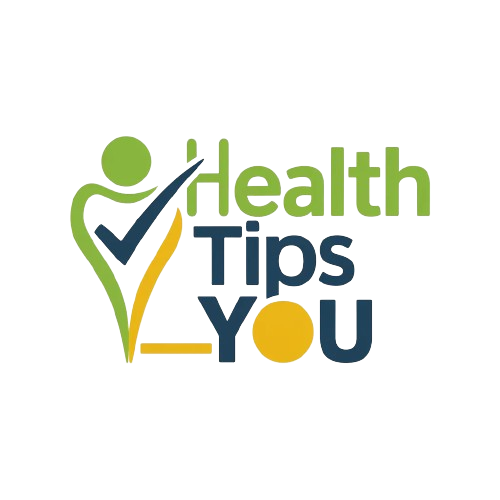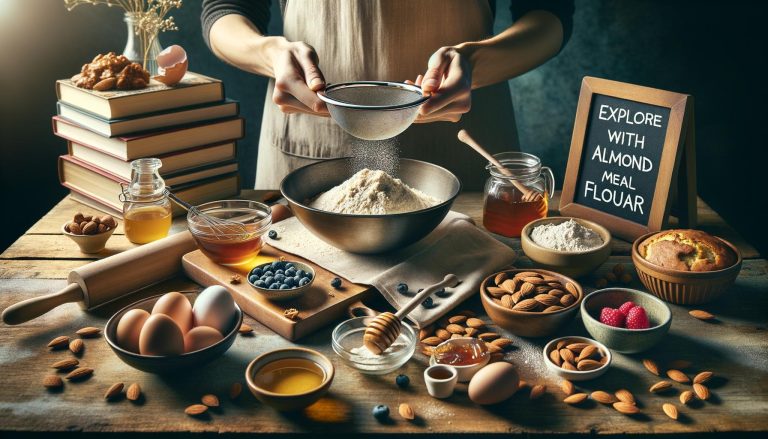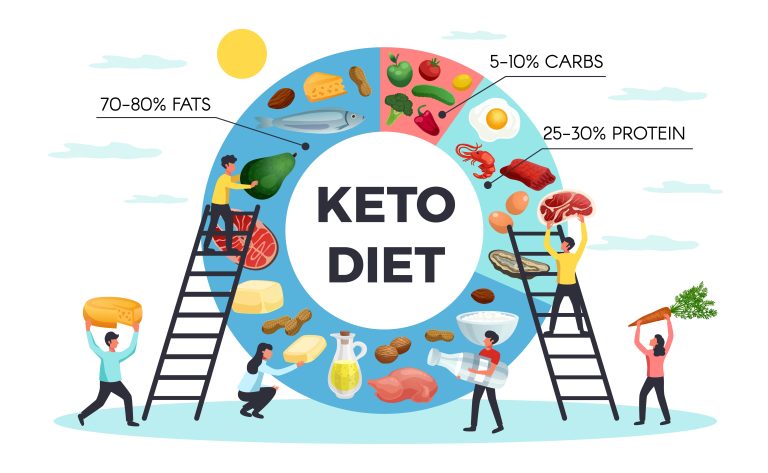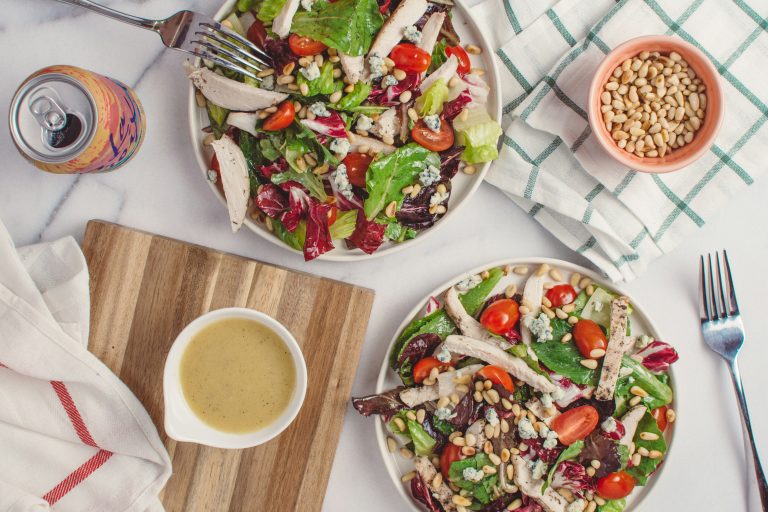Cholesterol-Lowering Snacks Explained

Cholesterol is pivotal in our overall health, and understanding its effect is more important than ever. At Healthy Tips You Blog, we’re dedicated to guiding you through the maze of dietary choices that directly impact your cholesterol levels.
Today, we’ll explore how simple snacks can play a big part in maintaining healthy cholesterol. We’ll introduce you to delicious and nutritious options that satisfy your hunger and support your heart’s health.
Impact of Diet on Cholesterol
Cholesterol, a substance in your blood, has become a key health indicator in recent years. Understanding the types of cholesterol and how diet influences these levels is essential. High-density lipoprotein (HDL), often labeled as ‘good’ cholesterol, aids in removing other forms of cholesterol from your bloodstream. Conversely, low-density lipoprotein (LDL), known as ‘bad’ cholesterol, can build up in your arteries, leading to health issues such as heart disease and stroke. Balancing these two types is vital for maintaining optimal health.
The foods you eat significantly impact your cholesterol levels. Certain foods can elevate harmful LDL levels, while others can enhance beneficial HDL levels, promoting heart health. Contrary to popular belief, not just the amount of cholesterol in your food matters but also the type of fats. Saturated and trans fats in processed foods can increase your LDL cholesterol, whereas unsaturated fats in foods like avocados and olive oil can help raise HDL cholesterol levels.

It cannot be overstated how crucial maintaining healthy cholesterol levels is. Elevated levels of LDL cholesterol are a major risk factor for heart disease and stroke, the leading causes of death worldwide. Conversely, higher levels of HDL cholesterol are associated with a lower risk of these conditions. By choosing the right snacks and foods, you can positively influence these levels.
Here are some practical tips for managing cholesterol through diet:
- Opt for whole grains over refined carbohydrates.
- Include nuts and seeds rich in omega-3 fatty acids, like walnuts and flaxseed, in your snacks.
- Choose fruits and vegetables high in soluble fiber, which can help reduce LDL cholesterol.
- Consider integrating plant sterols and stanols into your diet. They are found in fortified foods like margarine and orange juice.
- Limit red meat and full-fat dairy product intake, favoring lean proteins and low or non-fat dairy options.

For those interested in learning more about the benefits of specific diets, our Mediterranean and keto diet guides offer insights into how these eating patterns can influence cholesterol levels and overall health.
In summary, the impact of diet on cholesterol levels is profound. By making informed choices about the foods we eat, particularly snacks, we can significantly influence our cholesterol levels, thereby improving our heart health and reducing the risk of cardiovascular diseases.
Lowering Cholesterol with Snacks
Finding the right snacks can significantly impact your cholesterol levels and, by extension, your heart health. Let’s dive into how incorporating specific foods into your snack time can turn them into powerful allies in your quest for lower cholesterol.
Integrating Nuts and Seeds for Heart Health
Almonds, walnuts, and chia seeds are not just snacks but tiny nutritional powerhouses. Almonds are rich in monounsaturated fats, which are known for their ability to lower LDL (bad) cholesterol and raise HDL (good) cholesterol. Walnuts add to the mix with their high omega-3 fatty acid content, which is essential for heart health. Meanwhile, chia seeds are a fantastic fiber source, which can hinder cholesterol absorption into your bloodstream. Integrating these nuts and seeds into your daily diet can be as simple as adding them to yogurt and salads or keeping a small bag handy for a quick snack.

Fruits and Vegetables: Nature’s Cholesterol Busters
Avocados are packed with heart-healthy monounsaturated fats, making them a perfect cholesterol-lowering snack. Berries, such as strawberries, raspberries, and blueberries, provide a sweet treat loaded with antioxidants and fiber, aiding in reducing cholesterol levels. Apples are another excellent choice, offering soluble fiber, which is crucial in lowering blood cholesterol. Enjoy these fruits as they are, or blend them into a smoothie for a nutritious drink.
Whole Grains and Legumes: Fiber-Filled Options
Oats are one of the best whole grain options for lowering LDL cholesterol, thanks to their high soluble fiber content. Starting the day with a bowl of oatmeal or using oats to make energy balls can give you a cholesterol-lowering boost. Chickpeas and lentils are great legumes, rich in protein and fiber, making them ideal for snacks. Hummus made from chickpeas is a delicious and versatile dip, while lentils can be incorporated into soups or salads for an extra fiber kick.
For those looking to dive deeper into plant-based protein sources that can aid in managing cholesterol, explore our practical tips on incorporating plant-based proteins into your diet.
By choosing the right snacks, you can take a proactive step towards managing your cholesterol and improving your heart health. Remember, snacks are not just about keeping hunger at bay; they’re an opportunity to nourish your body and support your health goals.
Making Healthy Snack Choices
Incorporating cholesterol-lowering snacks into your diet isn’t just about eating the right foods; it’s also about making informed choices and planning ahead. Here are practical steps to seamlessly integrate healthful snacks into your daily routine, focusing on balance, taste, and nutrition.
Planning is Key
Start by planning your snacks just as you would for your main meals. This approach prevents last-minute, often less healthy choices. Identify snack times in your schedule and pack your snacks in advance. Whether it’s mid-morning or late afternoon, knowing you have a nutritious option ready can help you avoid convenient but unhealthy alternatives.
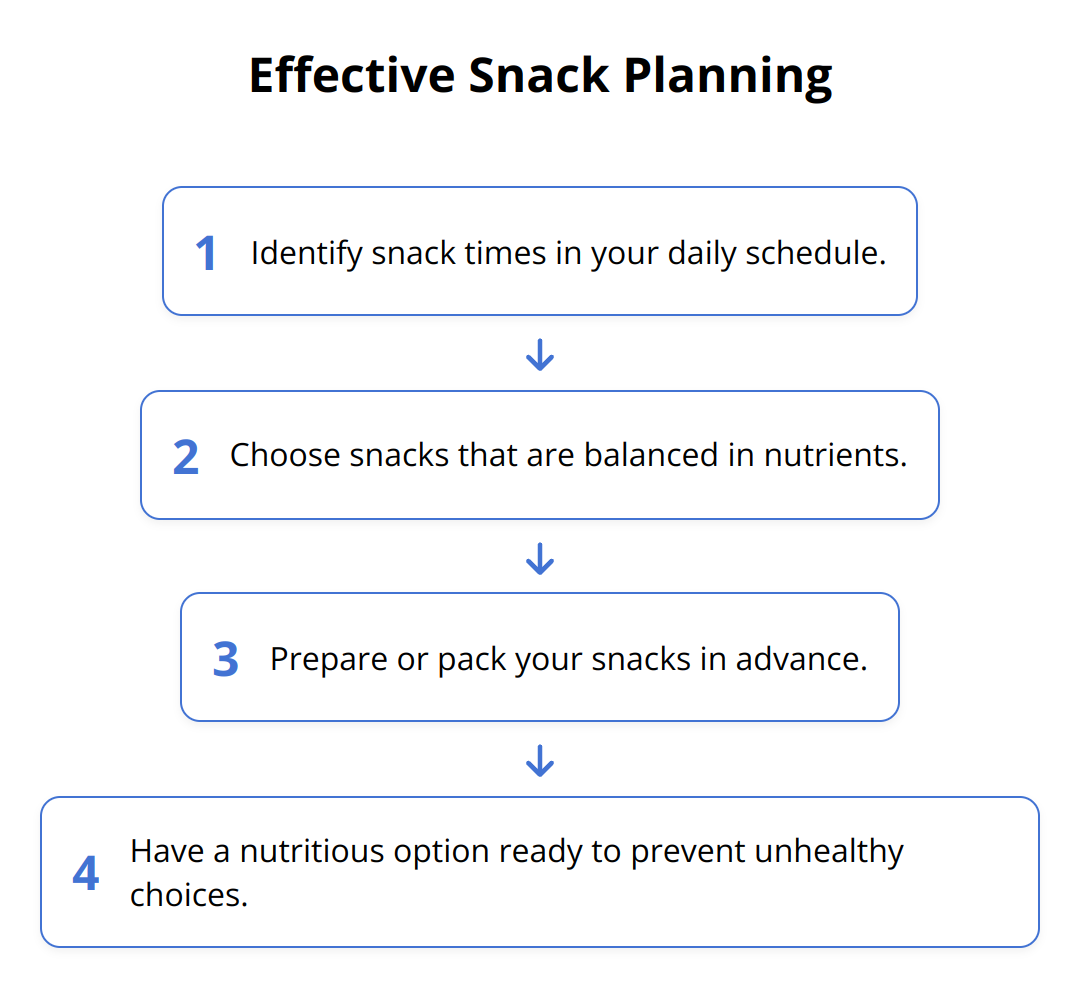
Understand Food Labels
Reading food labels is crucial for making better snack decisions. Pay attention to the saturated and trans fats content—these are the fats you want to limit. Look for snacks with high dietary fiber, protein, and healthy fats (like those from nuts or avocados). Products with added plant sterols and stanols can also be beneficial. If sugar is listed among the first ingredients, leaving that product on the shelf is best.
Seek Nutrient-Dense Snacks
Opt for snacks that provide more than just calories. Nutrient-dense options include vegetables with hummus, nuts, and seeds, or whole-grain crackers with avocado. These snacks offer vitamins, minerals, and other nutrients beneficial for lowering cholesterol and boosting overall health.
Combining Flavors and Textures
Combining different flavors and textures can balance taste and nutrition. For instance, the creaminess of Greek yogurt can be combined with the crunchiness of nuts and the sweetness of berries for a satisfying snack on all levels. This makes your snacks enjoyable and helps you stay full, providing sustained energy without spiking your cholesterol.
Smart Substitutions
Making smart substitutions can have a significant impact. Swap potato chips for air-popped popcorn (without added butter or salt), or choose dark chocolate over milk chocolate for a heart-healthy treat. Substitutions like these can significantly affect your cholesterol levels over time.
By integrating these strategies into your diet, you’re not just snacking; you’re nourishing your body and taking proactive steps towards better heart health. With some planning and knowledge, you can enjoy delicious, cholesterol-lowering snacks contributing to a healthier lifestyle.
Here are additional tips to consider:
- Always have a water bottle handy to stay hydrated.
- Portion control is essential; even healthy snacks can add up in calories.
- Experiment with different spices and herbs for flavor without added salt or sugar.
Incorporating these tips into your daily routine can make snacking a health-boosting part of your day. Explore our guide on healthy eating habits for more insights on managing cholesterol through diet.
Final Thoughts
In our exploration of cholesterol-lowering snacks, we’ve seen how specific foods can significantly impact our heart health. To recap, incorporating nuts and seeds like almonds and chia, fruits and vegetables such as avocados and berries, and whole grains and legumes including oats and lentils into our snacks can have a powerful effect on lowering harmful LDL cholesterol while boosting beneficial HDL cholesterol. Making these foods a staple in our snacking habits contributes to a well-balanced diet and supports our cardiovascular system.
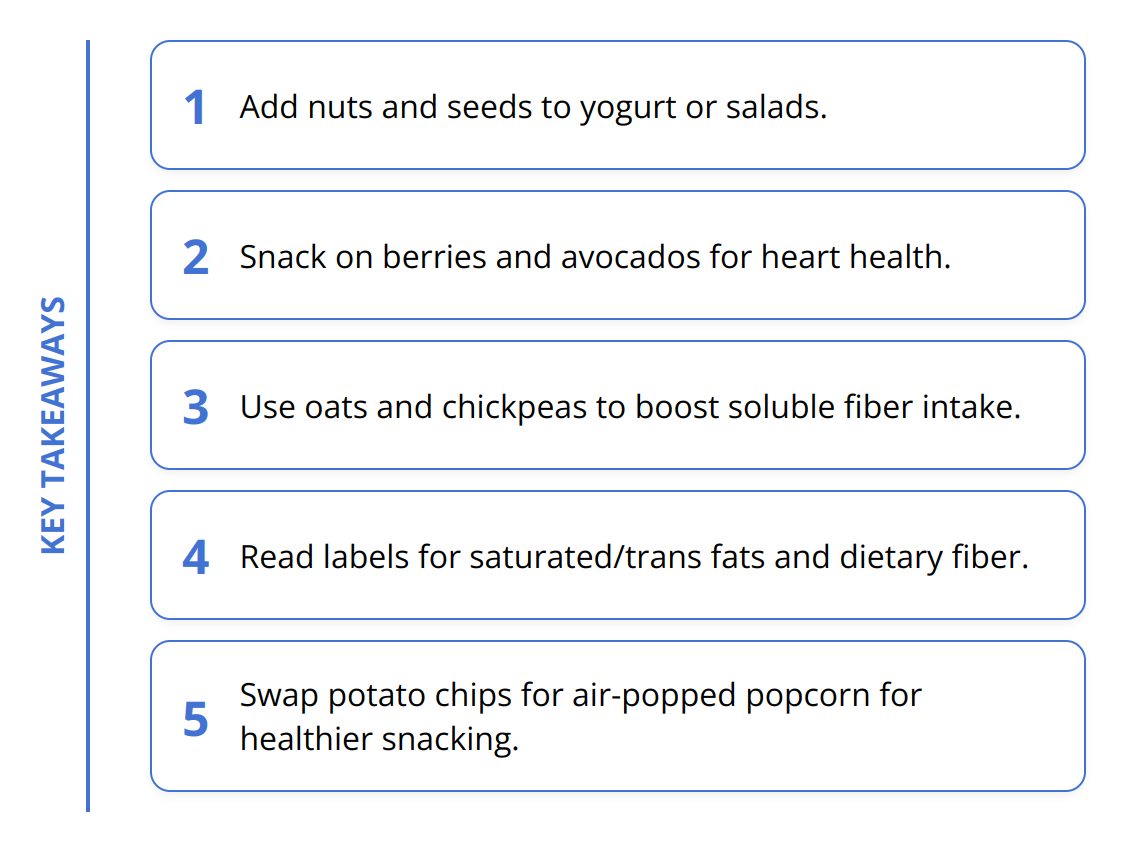
Snacks play an integral role in a heart-healthy diet, serving as opportunities throughout the day to fuel our bodies with nutrients that combat cholesterol and promote overall well-being. By making informed food choices, focusing on whole, nutrient-dense options, and understanding the impact of what we eat on our cholesterol levels, we empower ourselves to maintain optimal heart health.
We at Healthy Tips You Blog encourage you to embrace these healthful eating practices. By doing so, you’re not just choosing snacks; you’re choosing a healthier, more vibrant life. We believe that with the right information and a bit of planning, everyone can enjoy delicious, heart-healthy snacks that make a positive difference.
For more information and guidance on embracing a heart-healthy diet, we invite you to check out our guides on the Mediterranean diet and continue exploring our website for valuable insights and practical tips. Let’s make every bite count towards a healthier heart and a happier you.
